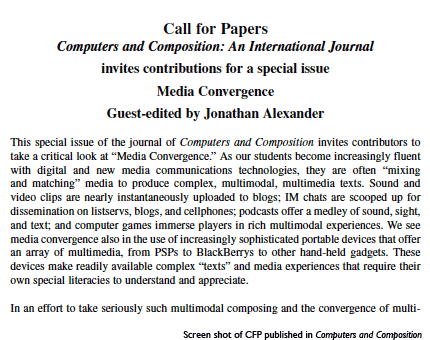Introduction
From the beginning of a term’s use, members of different discourse communities may appropriate or define the term in ways that meet the particular needs or reflect the values of that community. Additionally, within a discourse community, a term’s definition can undergo multiple iterations as its use evolves over time and in response to changing contextual landscapes. Terms that are developed in response to an emerging technology or practice often start out ambiguously defined, and are thus open to multiple interpretations, because such terms describe technologies and practices whose trajectories have not yet occurred.
The term new media in particular is one example of a term that has been used to describe the work being done in multiple academic disciplines, the fine arts, popular culture and the public realm. It has come to embody a variety of interpretations and uses. Within the rhetoric and composition community, new media has also been interpreted a number of ways among different scholars as well as among individual scholars who have pursued their scholarship of the term over a longer period of time.
Embracing the potential for multiple interpretations of a term to exist simultaneously or over time is advantageous for our scholarly work because it allows us to recognize the limitations of our disciplinary perspectives and encourages us to remain open to modifications to those perspectives as circumstances and knowledge change.
In the first audio segment, Jonathan Alexander comments on his decision to use multiple terms and phrases when developing a Call for Papers for a special issue of Computers and Composition on "Media Convergence," for which he served as guest editor.
In the last five audio segments, Cheryl Ball comments on the role that multiple understandings of the term new media have had on the evolution of that term for her and for the field. Ball has worked with the term "new media" extensively in her dissertation, in her edited collection (with Jim Kalmbach) Reading and Writing New Media, and in her experiences on the job market.
From the beginning of a term’s use, members of different discourse communities may appropriate or define the term in ways that meet the particular needs or reflect the values of that community. Additionally, within a discourse community, a term’s definition can undergo multiple iterations as its use evolves over time and in response to changing contextual landscapes. Terms that are developed in response to an emerging technology or practice often start out ambiguously defined, and are thus open to multiple interpretations, because such terms describe technologies and practices whose trajectories have not yet occurred.
The term new media in particular is one example of a term that has been used to describe the work being done in multiple academic disciplines, the fine arts, popular culture and the public realm. It has come to embody a variety of interpretations and uses. Within the rhetoric and composition community, new media has also been interpreted a number of ways among different scholars as well as among individual scholars who have pursued their scholarship of the term over a longer period of time.
Embracing the potential for multiple interpretations of a term to exist simultaneously or over time is advantageous for our scholarly work because it allows us to recognize the limitations of our disciplinary perspectives and encourages us to remain open to modifications to those perspectives as circumstances and knowledge change.
In the first audio segment, Jonathan Alexander comments on his decision to use multiple terms and phrases when developing a Call for Papers for a special issue of Computers and Composition on "Media Convergence," for which he served as guest editor.
In the last five audio segments, Cheryl Ball comments on the role that multiple understandings of the term new media have had on the evolution of that term for her and for the field. Ball has worked with the term "new media" extensively in her dissertation, in her edited collection (with Jim Kalmbach) Reading and Writing New Media, and in her experiences on the job market.

 Different definitions (2007)
Different definitions (2007) Drawing together the differences (2007)
Drawing together the differences (2007) To define or not (2007)
To define or not (2007) Technologies and texts (2007)
Technologies and texts (2007) Defining the field in our work (2007)
Defining the field in our work (2007) No need for consistency (2007)
No need for consistency (2007)